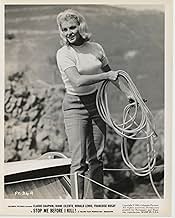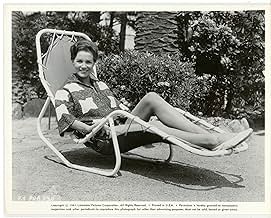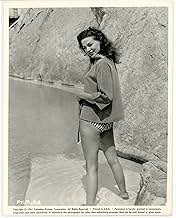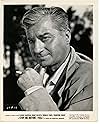NOTE IMDb
6,0/10
1,1 k
MA NOTE
Ajouter une intrigue dans votre langueAfter surviving a traumatic car accident, a race car driver travels to the Cote D'Azur to recover but is plagued by an urge to strangle his wife.After surviving a traumatic car accident, a race car driver travels to the Cote D'Azur to recover but is plagued by an urge to strangle his wife.After surviving a traumatic car accident, a race car driver travels to the Cote D'Azur to recover but is plagued by an urge to strangle his wife.
- Réalisation
- Scénario
- Casting principal
Françoise Rosay
- Madame Prade
- (as Francoise Rosay)
Andre Charisse
- Waiter at Villa
- (non crédité)
Roy Everson
- Onlooker at London Crash
- (non crédité)
Aileen Lewis
- Onlooker at Crash
- (non crédité)
Dickie Owen
- London Taxi Driver
- (non crédité)
Avis à la une
Psychological thriller from producer-director Val Guest could perhaps use more thrills and less psychology. Racecar driver fights against getting psychiatric help after a road accident--which killed the other driver--has left him badly shaken; his spouse begs him to reconsider, particularly after she becomes the target of her husband's subconscious rage. Adaptation of Ronald Scott Thorn's novel "The Full Treatment" (the movie's alternate title), by Thorn and Guest, has some tart dialogue and solid performances, and looks great as photographed by Gilbert Taylor, but the midsection of the film is redundant. Guest turns the plot-screws with careful deliberation, but is too slow in getting this web untangled. **1/2 from ****
'Stop Me Before I Kill' is AKA 'The Full Treatment'. Both titles seem to fit this film quite well.
A race car driver is in an accident and spends time in a coma, once he is awake he has the strange urge to kill his wife. His wife seeks help from a psychiatrist to help her husband overcome his urge and to find out why this is suddenly happening.
The ending of this film seem appropriate - very befitting. I will not give it away for those who have not seen the film and would like to.
This is not a bad mystery-drama - it's pretty good. No movie is "perfect" - they all have a few flaws and this one is no exception. The flaws in this film are minor.
All movies are hard to fathom - you have to suspend your beliefs to watch any movie. With this film you will have to do the same thing as with any film.
All in all a pretty good film. I enjoyed watching it.
7/10
A race car driver is in an accident and spends time in a coma, once he is awake he has the strange urge to kill his wife. His wife seeks help from a psychiatrist to help her husband overcome his urge and to find out why this is suddenly happening.
The ending of this film seem appropriate - very befitting. I will not give it away for those who have not seen the film and would like to.
This is not a bad mystery-drama - it's pretty good. No movie is "perfect" - they all have a few flaws and this one is no exception. The flaws in this film are minor.
All movies are hard to fathom - you have to suspend your beliefs to watch any movie. With this film you will have to do the same thing as with any film.
All in all a pretty good film. I enjoyed watching it.
7/10
Before addressing the acting, which I regard as uniformly superb throughout, I should add my agreement with several other reviewers that there are several scenes in this film that are simply repetitive, so that it might have been more effective with about 15 or 20 minutes cut out of it. However, it is still highly effective as is, due to the acting of four of the five principals, those being Diane Cilento, Ronald Lewis, Claude Dauphin and Bernard Braden. The fifth, the damned-near immortal Francoise Rosay is fine, but really contributes little to the film from an acting standpoint; she simply has little to do and nothing to act. It's the kind of role that in an American film would have been given to Argentina Brunetti or Celia Lovsky!
I'd never heard of this movie before - surprisingly, since I am a devotee of British film and acting from all periods and because this is, at least in the three leading roles, an impressive cast listing. I thought Cilento's accent was just fine throughout (if I didn't know her from anything else, I would never have thought of her as coming from Down Under); to me, it sounded Italian, but she uses a lot of French phrases and speaks French to others (the film takes place in France and England), so maybe that has confused other reviewers. The character's first name, "Denise", certainly sounds French rather than Italian, but that doesn't mean too much in a world where we have a noted Irish operatic baritone named Bruno Caproni! As with everything I've ever seen her in, Cilento is wonderful throughout, and very sexy in both voice and aspect. She beautifully captures both the character's love for, and fright of, her seemingly demented husband. Claude Dauphin was a pretty famous actor on both sides of the Atlantic at this time, and this is by far the best outing I have seen from him in an English-language film. I used to find him fairly hard to understand in our language, but not so in this one - and he has some really difficult dialogue (lots of it, and much of it replete with scientific jargon) to get through. He captures the psychiatrist's intelligence, egotism and kindness throughout, yet we are aware that there may be more to him than he shows on the surface. As for Ronald Lewis, I could never understand why he never became anything like an international star. He was a very good actor, with a resonant voice and wide emotional range, both very handsome and very macho (like good old George O'Brien, somebody always got him to remove his shirt in the course of a movie), and quite volatile as both villains and heroes - kind of like a visual and emotive cross between Stephen Boyd and Kirk Douglas. (This may have carried over to his personal life, as he did commit suicide when only 53.) Anyway, this is a very difficult role to play convincingly and he does it about as well as can be imagined (in fact, in this film he really did remind me of Stephen Boyd). A bit of a surprise is Bernard Braden, a Canadian actor with whom I was almost totally unfamiliar, but who plays an old friend of Lewis's who is about the only completely normal character in the film (Cilento is lovable, but hardly normal, unless one considers going to bed with someone you know may strangle you in the middle of the night to be normal), but he plays him extremely well and with a kind of of Everyman quality and lack of flair. Rosay, as I already said, is wasted here, but her English is actually less accented than is Dauphin's, perhaps reminding us that this most quintessentially French of French actresses did appear in a good number of English-language films during her long career.
With a few outdoor scenes deleted, this film could almost serve as a play for three major acting talents, so it is a bit 'talky', but the talk is pretty solid. Anyway, there is lots of emotional excess here and the actors are really up to it, and despite its overlong process in reaching a somewhat surprising, if well thought out, denouement, it maintains and builds interest and suspense throughout. It probably deserves a 6 rating, but being performance oriented, I give it an 8. If you enjoy watching good actors act, this is a film for you. Suspend your disbelief and just enjoy it.
I'd never heard of this movie before - surprisingly, since I am a devotee of British film and acting from all periods and because this is, at least in the three leading roles, an impressive cast listing. I thought Cilento's accent was just fine throughout (if I didn't know her from anything else, I would never have thought of her as coming from Down Under); to me, it sounded Italian, but she uses a lot of French phrases and speaks French to others (the film takes place in France and England), so maybe that has confused other reviewers. The character's first name, "Denise", certainly sounds French rather than Italian, but that doesn't mean too much in a world where we have a noted Irish operatic baritone named Bruno Caproni! As with everything I've ever seen her in, Cilento is wonderful throughout, and very sexy in both voice and aspect. She beautifully captures both the character's love for, and fright of, her seemingly demented husband. Claude Dauphin was a pretty famous actor on both sides of the Atlantic at this time, and this is by far the best outing I have seen from him in an English-language film. I used to find him fairly hard to understand in our language, but not so in this one - and he has some really difficult dialogue (lots of it, and much of it replete with scientific jargon) to get through. He captures the psychiatrist's intelligence, egotism and kindness throughout, yet we are aware that there may be more to him than he shows on the surface. As for Ronald Lewis, I could never understand why he never became anything like an international star. He was a very good actor, with a resonant voice and wide emotional range, both very handsome and very macho (like good old George O'Brien, somebody always got him to remove his shirt in the course of a movie), and quite volatile as both villains and heroes - kind of like a visual and emotive cross between Stephen Boyd and Kirk Douglas. (This may have carried over to his personal life, as he did commit suicide when only 53.) Anyway, this is a very difficult role to play convincingly and he does it about as well as can be imagined (in fact, in this film he really did remind me of Stephen Boyd). A bit of a surprise is Bernard Braden, a Canadian actor with whom I was almost totally unfamiliar, but who plays an old friend of Lewis's who is about the only completely normal character in the film (Cilento is lovable, but hardly normal, unless one considers going to bed with someone you know may strangle you in the middle of the night to be normal), but he plays him extremely well and with a kind of of Everyman quality and lack of flair. Rosay, as I already said, is wasted here, but her English is actually less accented than is Dauphin's, perhaps reminding us that this most quintessentially French of French actresses did appear in a good number of English-language films during her long career.
With a few outdoor scenes deleted, this film could almost serve as a play for three major acting talents, so it is a bit 'talky', but the talk is pretty solid. Anyway, there is lots of emotional excess here and the actors are really up to it, and despite its overlong process in reaching a somewhat surprising, if well thought out, denouement, it maintains and builds interest and suspense throughout. It probably deserves a 6 rating, but being performance oriented, I give it an 8. If you enjoy watching good actors act, this is a film for you. Suspend your disbelief and just enjoy it.
"Stop Me Before I Kill" or "The Full Treatment" is a 1960 film with a screenplay by Val Guest, who also directed.
The story concerns a famous race car driver, Alan Colby (Ronald Lewis), who was involved in a terrible car crash with his wife Denise (Diane Cilento). He is unable to race, and he and Denise go to the south of France on vacation.
Alan goes through swift mood shifts - the slightest word can set off his temper. And he keeps being tempted to strangle his wife - in fact, he nearly does a couple of times.
This, of course, is where one has to suspend belief because why the heck would she stay with someone who has attempted to strangle her and whose temper flares at the drop of a hat? I understand women in abusive situations, but I don't know, my husband trying to kill me takes it to a new level.
A psychiatrist they meet, Dr. David Prade (Claude Dauphin) offers to help. Alan is hesitant, but once back in London, where Prade has also returned, he agrees. At the end of the treatment, he feels that he is cured. He is able to get back on the racing track and has no temptation to hurt Denise.
Right before he is to leave for a race, Alan wakes up and finds that Denise is not there. In fact, all the evidence points to the fact that she has been murdered.
This was a very good story that suffered from an unbalanced script. The film went on too long, and the psychiatric scenes were endless. Diane Cilento is a beautiful and heartfelt Denise, Claude Dauphin is likable, and Ronald Lewis for me lacked subtlety in a difficult role. A good-looking man, in the beginning of the film, he reminded me of David Hasselhoff; fortunately, the resemblance faded somewhat.
Sadly Ronald Lewis committed suicide in 1982, bankrupt and his career in the doldrums.
In other hands and a bigger budget, this could have been an excellent film. However it's worth seeing for the story.
The story concerns a famous race car driver, Alan Colby (Ronald Lewis), who was involved in a terrible car crash with his wife Denise (Diane Cilento). He is unable to race, and he and Denise go to the south of France on vacation.
Alan goes through swift mood shifts - the slightest word can set off his temper. And he keeps being tempted to strangle his wife - in fact, he nearly does a couple of times.
This, of course, is where one has to suspend belief because why the heck would she stay with someone who has attempted to strangle her and whose temper flares at the drop of a hat? I understand women in abusive situations, but I don't know, my husband trying to kill me takes it to a new level.
A psychiatrist they meet, Dr. David Prade (Claude Dauphin) offers to help. Alan is hesitant, but once back in London, where Prade has also returned, he agrees. At the end of the treatment, he feels that he is cured. He is able to get back on the racing track and has no temptation to hurt Denise.
Right before he is to leave for a race, Alan wakes up and finds that Denise is not there. In fact, all the evidence points to the fact that she has been murdered.
This was a very good story that suffered from an unbalanced script. The film went on too long, and the psychiatric scenes were endless. Diane Cilento is a beautiful and heartfelt Denise, Claude Dauphin is likable, and Ronald Lewis for me lacked subtlety in a difficult role. A good-looking man, in the beginning of the film, he reminded me of David Hasselhoff; fortunately, the resemblance faded somewhat.
Sadly Ronald Lewis committed suicide in 1982, bankrupt and his career in the doldrums.
In other hands and a bigger budget, this could have been an excellent film. However it's worth seeing for the story.
This is a surprisingly good film and effective thriller but someone should have advised writer/director Val Guest that it really was a little too long. Very simple to put right too, because it is clear there is just a little too much of the 'going crazy' scenes in the first half and maybe a little bit too drawn out and twisty an ending. Otherwise its great, I wasn't particularly one over by Ronald Lewis if effectively menacing at times, but Claude Dauphin is great and Diane Cilento marvellous in one of her finest roles. I enjoyed the premise and particularly the psychiatric scenes, bit surprised by the appearance of the CO2 canister, but overall very involving with plenty of changes in pace and scenery. Fifteen/twenty minutes snip and this would be far more successful. Shame.
Le saviez-vous
- AnecdotesSean Connery visited the set during filming in the South of France. He was dating Diane Cilento at the time. They married the following year.
- GaffesNear the beginning of the film, after Alan successfully passes the truck and pulls over to the side of the road, he leaps out of the car without setting the parking brake. Denise is seen pulling on the handbrake, but the car continues to move until the end of the shot, with the front of the car going past the roadside sign. In the next shot, the car has been moved back so that its front is even with the sign.
- Citations
David Prade: You know, only the unsuccessful murderers disclose their crimes.
Alan Colby: And the successful ones?
David Prade: Well, they draw their reward from a feeling of personal power.
- Versions alternativesColumbia cut the film to 93 min when they released it in the US, but the TV arm of Columbia, Screen Gems, syndicated a toned down 107 min. print to US television for years.
- ConnexionsReferenced in DVD/Lazerdisc/VHS collection 2016 (2016)
Meilleurs choix
Connectez-vous pour évaluer et suivre la liste de favoris afin de recevoir des recommandations personnalisées
- How long is Stop Me Before I Kill!?Alimenté par Alexa
Détails
- Date de sortie
- Pays d’origine
- Langues
- Aussi connu sous le nom de
- Obsesión diabólica
- Lieux de tournage
- Albert Embankment, Lambeth, Londres, Angleterre, Royaume-Uni(Ronald and Diane's London apartment)
- Sociétés de production
- Voir plus de crédits d'entreprise sur IMDbPro
- Durée1 heure 48 minutes
- Couleur
- Rapport de forme
- 2.35 : 1
Contribuer à cette page
Suggérer une modification ou ajouter du contenu manquant

Lacune principale
By what name was Traitement de choc (1960) officially released in Canada in English?
Répondre































